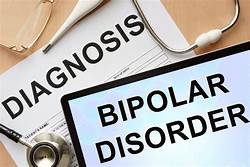How Is Bipolar Disorder Diagnosed?
One important thing to know is how mental illnesses are diagnosed and what to expect on your visit to your doctor. In order to be diagnosed with bipolar disorder, a mental health professional must form a diagnosis and to do this a person must first meet the diagnostic criteria for Bipolar Disorder. The diagnostic criteria is found in the Diagnostic and Statistical Manual Of Mental illnesses (DSM-5).
Have you been experiencing mental health issues and you believe you may meet the criteria for bipolar disorder and not sure what to expect on your visit to the doctor?
I cannot stress enough how important it is for you be open and honest with your doctor about your symptoms and how it’s affecting you daily. Do not be shy or ashamed, your main focus should be on treatment, recovery and healing and nothing should get in the way of taking care of you. It’s ok to ask for help, if you are nervous or if you feel you can’t do this on your own ask a trusted family member or a close friend to go with you.

In order for someone to be diagnosed with bipolar disorder first he/she must meet the criteria for diagnosis.
What to expect!
Diagnosing Bipolar Disorder
The most important diagnostic tool may be talking openly with the doctor about your mood swings, behaviors, and lifestyle habits.
While a physical examination can reveal a patient’s overall state of health, the doctor must hear about the bipolar signs and symptoms from the patient in order to effectively diagnose and treat bipolar disorder.
What does a doctor need to know to diagnose bipolar disorder?
A bipolar disorder diagnosis is made only by taking careful note of symptoms, including their severity, length, and frequency. “Mood swings” from day to day or moment to moment do not necessarily indicate a diagnosis of bipolar disorder. Rather, the diagnosis hinges on having periods of unusual elevation or irritability in mood that are coupled with increases in energy, sleeplessness, and fast thinking or speech. The patient’s symptoms are fully assessed using specific criteria from the American Psychiatric Association’s Diagnostic and Statistical Manual of Mental Disorders (DSM-5).
In making the diagnosis of bipolar disorder, the psychiatrist or other mental health expert will ask you questions about your personal and family history of mental illness and bipolar disorder or other mood disorders. Because bipolar disorder sometimes has a genetic component, family history can be helpful in making a diagnosis. (Most people with bipolar disorder, however, do not have a family history of bipolar disorder.) Also, the doctor will ask detailed questions about your bipolar symptoms. Other questions may focus on reasoning, memory, ability to express yourself, and ability to maintain relationships.
Your doctor may have you fill out a mood questionnaire or checklist to help guide the clinical interview when he or she assesses mood symptoms. In addition, your doctor may order blood and urine tests to rule out other causes of your symptoms. In a toxicology screening, blood, urine, or hair are examined for the presence of drugs. Blood tests also include a check of thyroid stimulating hormone (TSH) level, since depression is sometimes linked to thyroid function. Now that you have gotten this far, one of the most difficult part is over, now it’s time to work on the proper treatment and medication with your therapist and psychiatrist and you’re on your way to recovery.
If you have any questions queries or concerns about bipolar disorder or any mental health issues please feel free to leave a comment or drop me an email I would be happy to assist in anyway I can.
Disclaimer: I do not diagnose or treat mental illness, the information provided above is strictly for information purposes only.




Great weblog right here! Also your web site lots up very fast!
What web host are you using? Can I am getting your affiliate hyperlink in your host?
I want my site loaded up as quickly as yours
lol https://parbriz-bucuresti.ro/parbriz-lancia.html
LikeLike
Great weblog right here! Also your web site lots up very fast!
What web host are you using? Can I am getting your affiliate hyperlink in your host?
I want my site loaded up as quickly as yours lol https://parbriz-bucuresti.ro/parbriz-lancia.html
LikeLike
Like!! Great article post.Really thank you! Really Cool.
LikeLike